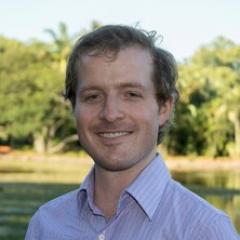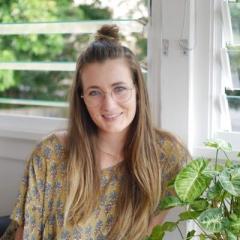CBCS researcher Dr Matthew Holden and recent CBCS alum Dr Brooke Williams have been named 2024 Young Tall Poppy finalists for Queensland.

Photo credit: Office of the Queensland Chief Scientist.
Led by the Australian Institute of Policy and Science, the Young Tall Poppy Awards celebrate accomplished Australian scientists across each state and territory who are at the forefront of research in their fields and demonstrate commitment to promoting science to the broader community.
Matt and Brooke received their honours at an awards ceremony held on the evening of Thursday 15 August at QUT’s Gardens Point campus, as part of National Science Week (10-18 August 2024) activities in Queensland. There they joined 14 other finalists representing excellence in science in Queensland across many fields.
Matt: maths as my pathway back to nature

Photo credit: Matthew Holden
Matt is a lecturer and ARC DECRA Fellow in the School of Mathematics and Physics and also serves on the CBCS Management Committee as the Deputy Director – Research.
Matt says of his work and career journey:
“As a toddler, I grabbed a wasp … ouch! Immediately, I was terrified by nature.
“My introduction to mathematics wasn’t much better.
“I was scolded for developing my own methods of solving problems – methods that often failed. But at university, mathematicians embraced creativity and failure. I was hooked, and unexpectedly, mathematics was my pathway back to nature.
“I wanted to use maths for good and noticed there were heated debates between environmental scientists about how to solve the world’s greatest challenges. Should agriculture be organic? Or should we farm intensely over as little area as possible - saving more forest, where species thrive? Do fishing regulations protect marine wildlife?
Or do we need areas with no fishing?
At the heart of these questions are trade- offs. We need food, shelter, and products to live, but we also want to protect the environment. My research helps identify strategies that meet people’s needs while maximising environmental benefits. I do this by stripping environmental problems down to their most essential components and using mathematics to reveal fundamental principles of effective environmental management.
The maths helps explain why some strategies work better than others so we can learn and adapt to new challenges.”
Brooke: informing conservation decision-making

Photo credit: Anthony Weate
Brooke recently joined Queensland University of Technology in a new role but says “all the research and work I did to get this award was through CBCS”. She is continuing her affiliation with CBCS through an Honorary appointment.
She says of her project, “We are currently faced with unprecedented environmental challenges, including biodiversity loss and climate change, which negatively impact human wellbeing.
In response, nations have come together to commit to global policies and participate in environmental markets aimed at addressing these issues. However, translating broadscale policies and frameworks to the local level comes with a range of often unexpected challenges. These can include a mismatch between expected and realised outcomes, agricultural displacement (land use practices are moved out of their original location to somewhere else), and unequal costs and benefits to people.”
Brooke is using spatial information on biodiversity, ecosystem services (the benefits people derive from nature, such as carbon sequestration) and human activities to develop innovative tools and metrics to better inform decision- makers on the outcomes of broadscale environmental policies and markets. Her research directly contributes to improving global biodiversity conservation and climate change mitigation outcomes.
The Queensland awards are a joint initiative with the Office of the Queensland Chief Scientist.
Read more of these stories in Issue 19 of the CBCS Newsletter and follow us on X (Twitter) and LinkedIn.


